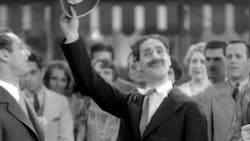Groucho Marx famously quipped, “I don’t care to belong to any club that would have me as a member,” the wittiness of which is taking on a fresh resonance, about 60 years later, but now with less humor and more hubris. The world has become so crowded and chaotic, and social interactions have become so contentious, that everyone seems to believe they can just pick up and walk away from their problems. To some extent, we can do that, but there is a cost.
As I write there is much concern about the election pending in Great Britain to determine that nation’s future membership in the European Union. One faction sees great financial risk to departing the financial and regulatory union, while the other sees separation as necessary to restore the singular value of their citizenship and heritage. I see merit on both sides of the debate, and I’m glad I don’t have to choose. I’m also glad that my views on the matter will likely appear too late to influence anyone’s decision. While the so-called Brexit decision is certainly consequential for a truly democratic society, for thoughtful and responsible individuals everywhere it is emblematic of the post-modern, pre-egalitarian, pseudo-global civilization we share.
From here, the Brexit choice seems almost a perfect dilemma: whether to be cautious and pragmatic about the current state of affairs; or whether to be bold and passionate about what values or principles you will stand on, and fight to maintain.
For me and for most people I know, this is the sort of choice we believed we would be spared. From the middle of the 20th Century to its end, we benefitted from remarkable stability in our public institutions (government, media, education, commerce, etc.), which for all the difficulties over that time meant an atmosphere that was extraordinarily conducive to social progress and individual prosperity. We didn’t have to make many decisions about principles, because these were not much in dispute: we knew who shared our values, and we knew who opposed them. Our disputes were about strategies, not about outcomes.
In that milieu, there developed a sharper sense of social roles: it resulted in the gradual (actually, fast by historical standards) expansion of individual liberties and privileges; and in less consequential ways it meant one’s identity became more definitional. The Establishment Man was a conventional thinking, club-joining, comfort-enjoying individual, an “insider”; the anti-establishment type was more a open-minded, free-spirited, aesthetically adventurous individualist, relishing the distinction of being an “outsider” in free society. When Groucho disclaimed membership in the Friars Club in 1959, he was riffing on such stereotypes.
Forging Magazine is an IndustryWeek companion site within Penton's Manufacturing & Supply Chain Group.
About the Author
Robert Brooks
Content Director
Robert Brooks has been a business-to-business reporter, writer, editor, and columnist for more than 20 years, specializing in the primary metal and basic manufacturing industries. His work has covered a wide range of topics, including process technology, resource development, material selection, product design, workforce development, and industrial market strategies, among others. Currently, he specializes in subjects related to metal component and product design, development, and manufacturing — including castings, forgings, machined parts, and fabrications.
Brooks is a graduate of Kenyon College (B.A. English, Political Science) and Emory University (M.A. English.)
